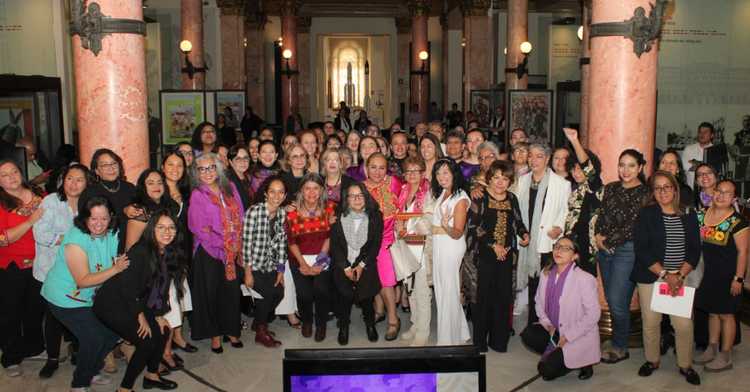- More than one hundred women in decision-making positions in Mexican government institutions gathered at the Telegraph Museum.
- Through the Women Transforming Mexico Network, they advance the goal of promoting gender equality and guaranteeing women's rights.
Financiera para el Bienestar (Finabien) and the National Women's Institute (Inmujeres) worked together to hold a meeting through the Women Transforming Mexico Network, called "Balance of achievements and strategies for continuity in priority projects", which brought together more than one hundred women in decision-making positions from more than 30 Mexican government agencies.
The event addressed the issue of guaranteeing women's rights, as well as the actions that have been undertaken throughout the current administration to strengthen gender equality in the positions and functions of government institutions.
The general director of Financiera para el Bienestar, Rocio Mejia Flores, said that in all areas there are women with a feminist perspective, a gender perspective and that it is not just a women's movement, but a true revolution.

"We have a very important campaign called zero tolerance, zero tolerance to workplace harassment and zero tolerance to sexual harassment, this has been a campaign that has also allowed us to make visible all this cultural problem of entrenchment that we had in the institutions and that all complaints are made.
"We also have the issue of women's economic autonomy, we have credit programs, microcredits to businesses, remittances program and the popular savings program, all this has allowed us to emphasize more the issue that we are working on with the National Institute of Women, to know what we do, what we need for women to really jump and take that step towards their economic empowerment."
The head of Inmujeres, Nadine Gasman Zylbermann, said that these two years of the network, which was established in June 2022, have helped to continue encouraging more women to continue participating in the country's public life.

"Our Network of Women Transforming Mexico, made up of women leading institutions of the Federal Public Administration, is an example of good practice in this administration, which has managed to establish itself as a plural, supportive, diverse and empathetic space for sharing knowledge, initiatives and projects from a gender, feminist, intersectional, multicultural and social justice perspective."
According to data from the Ministry of Public Function (SFP), the participation of women in the Federal Public Administration (APF) has increased from 49 percent in 2019 to 51 percent in 2023.
The national coordinator of Civil Protection, Laura Velázquez Alzúa, affirmed that women, with their dedication and leadership, are playing a key role in building a stronger, more resilient and prepared country in the face of environmental challenges. "Together we can and will build a future where gender equality is a fundamental pillar of our national development."

In the context of this meeting, he announced that this Thursday, February 29, the Chamber of Deputies will pass the new General Law on Civil Protection and Disaster Risk Management. This law is the result of the continuous work of transformation undertaken by the Mexican Government and has been carefully designed with a gender perspective and priority to the attention of women, girls, the elderly and the most vulnerable population.
The head of the Legal Affairs Unit of the Ministry of Culture, Eréndira Cruz Villegas Fuentes, emphasized that culture is a basic tool in Mexico's transformation, and it is only possible with women; she also pointed out the importance of women in Mexico's culture and referred to the glass ceiling that existed and is gradually disappearing, starting with the Creative Seedbed program, which brings girls and adolescents closer to culture and education, so that they embrace this right and these spaces as their own.
The general director of the Mexican Radio Institute, Aleida Calleja Gutiérrez, expressed that "it is a long-standing demand of feminism that women have more decision-making positions in the media, because it is necessary that the messages they broadcast are elaborated from gender narratives and perspectives, which should be from the children's bars to the newscasts. For this reason, at IMER we have made room for young feminists, Afro-Mexican and indigenous women.

"In the media many of the patriarchal values are reproduced because most of its decision makers are men. We also have to achieve parity in the media and especially in the public media."
The event took place at the Telegraph Museum and was attended by the head of the Federal Treasury, Elvira Concheiro Bórquez; the Undersecretary of Foreign Affairs, María Teresa Mercado Pérez; the Director General of the National System of Integral Development for the Family (DIF), Nuria Fernández Espresate; the Director of Reconstruction of the Social Fabric of the National Commission for the Prevention and Eradication of Violence against Women (Conavim), María Rosa Márquez Cabrera; and the Secretary of Education, Science, Science, Technology and Culture, María Rosa Márquez Cabrera; the Director of Reconstruction of the Social Fabric of the National Commission to Prevent and Eradicate Violence against Women (Conavim), María Rosa Márquez Cabrera; and the Secretary of Education, Science, Technology and Innovation of Mexico City, Ofelia Angulo Guerrero.
During this event, a commitment was made to continue promoting the advancement of women, to continue strengthening the gender focus in the public policy of President Andrés Manuel López Obrador, and to achieve the continuity of these policies.
--
